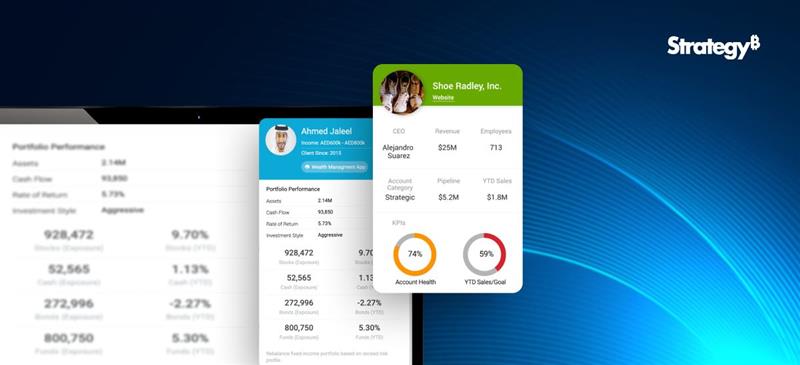Nevertheless, despite these challenges, SMBs should take heart in the fact that the global BI market is projected to grow to an impressive $43 billion by 2028. While the current adoption rate of BI among SMBs may be lower than that of larger companies, this simply means that there is plenty of room for growth and innovation in this space. By embracing BI and leveraging its power to make data-driven decisions, SMBs can level the playing field and even gain a competitive edge over their larger rivals. So, let’s not lament the obstacles, but rather focus on the opportunities that BI presents for small businesses and startups to achieve success in the digital age.
The Solution: BI Tools
To overcome the challenges, SMBs can turn to technology and budget as more surmountable obstacles. While many businesses today utilize SaaS-driven technology to automate processes such as:
- Creating Invoices
- Sending Messages
- Tracking Time
- Running Marketing Campaigns
The data generated from these operations can be overwhelming and expensive to collect. This is where business intelligence (BI) tools come into play. SMBs that have undergone digital transformation are already generating data related to their business operations, and with the right BI features, they can derive valuable insights to meet their business objectives. With BI, small business owners can analyze consumer behaviour, estimate market trends, forecast sales, and improve customer experience – capabilities that were previously thought to be exclusive to enterprise companies. By leveraging BI, SMBs can level the playing field and gain a competitive edge.
Business Intelligence (BI) is a set of tools, techniques, and technologies that help businesses collect, analyze, and interpret data to make better decisions. BI is an essential tool for large enterprises, but its benefits are not limited to big organizations. Small and medium-sized businesses (SMBs) can also benefit from BI in many ways.
Top Benefits of BI for SMBs
1. Improved Decision-making
The primary benefit of BI is improved decision-making. BI helps SMBs to make informed decisions by providing them with the necessary data and insights. By analyzing data from various sources, such as sales, customer feedback, and market trends, SMBs can make data-driven decisions that lead to better outcomes. For instance, if an SMB is looking to expand its business, BI can help it identify the best markets to target and the products or services that are likely to perform well in those markets.
2. Increased Efficiency
BI can help SMBs to increase their efficiency by automating repetitive tasks and reducing manual errors. With BI, businesses can automate tasks like report generation and data analysis, which saves time and reduces the likelihood of errors. By freeing up time, SMBs can focus on more critical tasks like developing new products, improving customer service, and expanding their business.
3. Better Customer Experience
BI can help SMBs to understand their customers better and improve their experience. By analyzing customer data, SMBs can identify customer needs and preferences, which enables them to offer more personalized products and services. For instance, if an SMB analyzes customer data and identifies that most of its customers prefer a particular type of product, it can focus on producing more of that product.
4. Competitive Advantage
BI can give SMBs a competitive advantage by providing them with insights that their competitors don’t have. By analyzing data from various sources, SMBs can identify new market opportunities, develop better products, and improve their services. With this information, SMBs can stay ahead of their competitors and respond quickly to changes in the market.
5. Improved Financial Performance
BI can help SMBs to improve their financial performance by identifying areas where they can cut costs and increase revenue. By analyzing financial data, SMBs can identify areas where they are overspending and find ways to reduce costs. Additionally, by analyzing sales data, SMBs can identify products that are not performing well and focus on developing or promoting products that are more profitable.
6. Better Inventory Management
BI can help SMBs to manage their inventory more effectively by providing real-time information on inventory levels and demand. By analyzing sales data, SMBs can identify which products are selling well and ensure that they have enough inventory to meet customer demand. By having the right inventory levels, SMBs can avoid stockouts and lost sales.
7. Improved Operational Efficiency
BI can help SMBs to improve their operational efficiency by providing real-time data on key performance indicators (KPIs). By tracking KPIs like sales, inventory levels, and customer satisfaction, SMBs can identify areas where they need to improve and take action to address those areas. With this information, SMBs can make continuous improvements to their operations, which leads to better outcomes and increased profitability.
Summing Up
BI is a valuable tool for SMBs that want to improve their decision-making, increase efficiency, and gain a competitive advantage. By analyzing data from various sources, SMBs can make informed decisions that lead to better outcomes, improve their operational efficiency, and improve their financial performance. With the benefits of BI, SMBs can stay ahead of their competitors, improve their customer experience, and grow their business.
Business Intelligence services extended by Beinex deliver solutions to all your business questions. At-a-glance analysis facilitated by cutting-edge BI tools does wonder to every industry. Analysing enormous and complex data couldn’t be mind-boggling for you anymore with BI tools. With Beinex, you can interact with an agile and intuitive system to validate your data, navigate your vision, and execute it in a data-driven way to tap into potent entrepreneurial potential.




